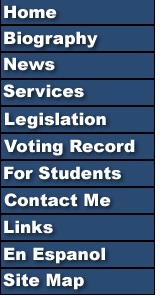


Privacy Notice
Senator
Feinstein Urges Department of Justice to
Aggressively Enforce Bombmaking Statute
- First
person prosecuted under law is scheduled
to be taken into custody tomorrow -
September 3, 2003
Washington, DC - U.S. Senator Dianne Feinstein (D-Calif.) has called upon the Department of Justice to aggressively enforce a law that makes it illegal to distribute bombmaking information with the knowledge or intent that the information will be used to commit a violent federal crime.
This statute, which was established
through legislation sponsored by Senator Feinstein in 1997, was recently
applied for the first time in a case against Sherman Austin, an anarchist
who put links to bombmaking information on his website. Austin, who is
scheduled to surrender to U.S. Marshals tomorrow, was sentenced to 12
months in prison, a $2000 fine, three years of probation, as well as other
restrictions.
In this case, according to
press reports, the federal prosecutor reached two separate plea agreements
with Austin, but the presiding judge threw out the initial pleas, saying
that they were insufficient and that the government was not taking the
crime "seriously" enough.
In a letter to Attorney General
John Ashcroft, Senator Feinstein wrote: "I was pleased to learn
recently that Sherman Austin was sentenced earlier this month in federal
court in Los Angeles for violating 18 U.S.C. 842(p), a law I authored
mandating up to 20 years in prison for anyone who distributes bombmaking
information knowing or intending that the information will be used for
a violent federal crime. However, I remain concerned by reports that federal
prosecutors may not be taking this important anti-terrorism tool seriously.
Thus, I write to request your assistance in ensuring that DOJ personnel
know about section 842(p) and are aggressively enforcing it.
A few weeks ago, because of Mr. Austin's admitted violation of section 842(p), U.S. District Court Judge Stephen Wilson sentenced him to 12 months of custody, a $2000 fine, three years probation, and as well as other restrictions. However, I was dismayed to learn that Judge Wilson imposed this sentence only after throwing out two previous plea agreements reached with Mr. Austin as too lenient. The first plea agreement gave Mr. Austin one month in prison followed by five months in a halfway house and the second agreement gave him four months custody and four months in a halfway house.
According to press
reports, Judge Wilson stated at a hearing on the second plea agreement
that, while the Austin case had 'national and international implications,'
the government was not taking it 'seriously' and that in fact the plea
agreement was 'shocking.' Subsequently, upon learning that the plea agreement
had not been cleared by top DOJ officials, the judge asked the prosecutor
to contact Main Justice as well as FBI Director Robert Mueller and solicit
their views on the matter.
In my view-and apparently the view of at least one federal judge-the Department of Justice needs to do a better job making prosecutors aware of section 842(p) and ensuring that they take the law seriously. It is dismaying that there has only been one conviction under section 842(p) in the four years that the law has been on the books and that, once that conviction was obtained, a federal judge described the final recommended plea bargain for the convicted individual as 'shocking' in its leniency. Moreover, I was also disturbed to read that Mr. Austin, in an interview after his sentencing, stated that 'The fact that bomb-making information is readily available on the Internet doesn't concern the feds. If someone were to use a bomb to do something illegal, there's plenty of information out there….'
Last May, I met with
then Deputy Assistant Attorney General Alice Fisher and FBI Director Robert
Mueller. Both Ms. Fisher and Director Mueller assured me that they would
arrange for widespread distribution of information about section 842(p)
within their respective agencies. A month later, Director Mueller informed
me that the FBI had sent an electronic communication to all field offices
encouraging awareness and enforcement of section 842(p). However, I never
received word that the DOJ Criminal Division had issued any similar communication.
Section 842(p) should
be an important tool in fighting terrorism but, unfortunately, it has
been little used. I would greatly appreciate your assistance in getting
the word out to all to all appropriate components of the Department of
Justice about this statute."
###